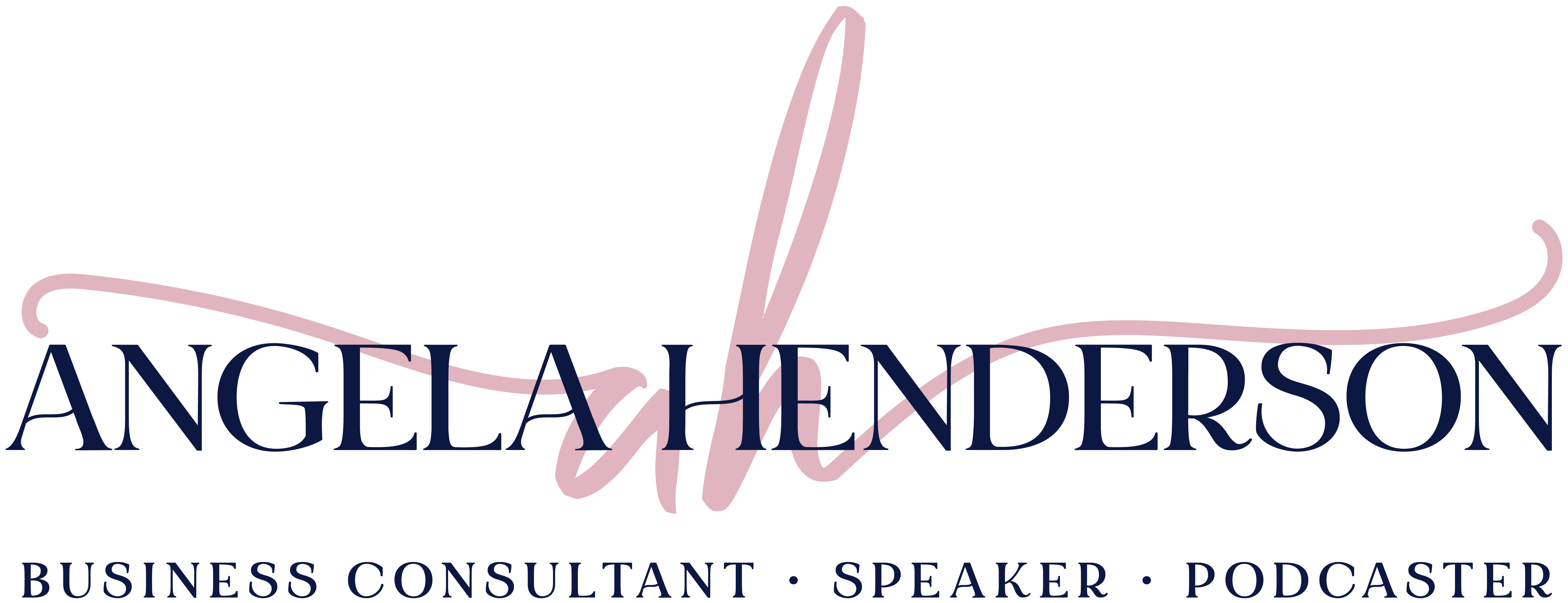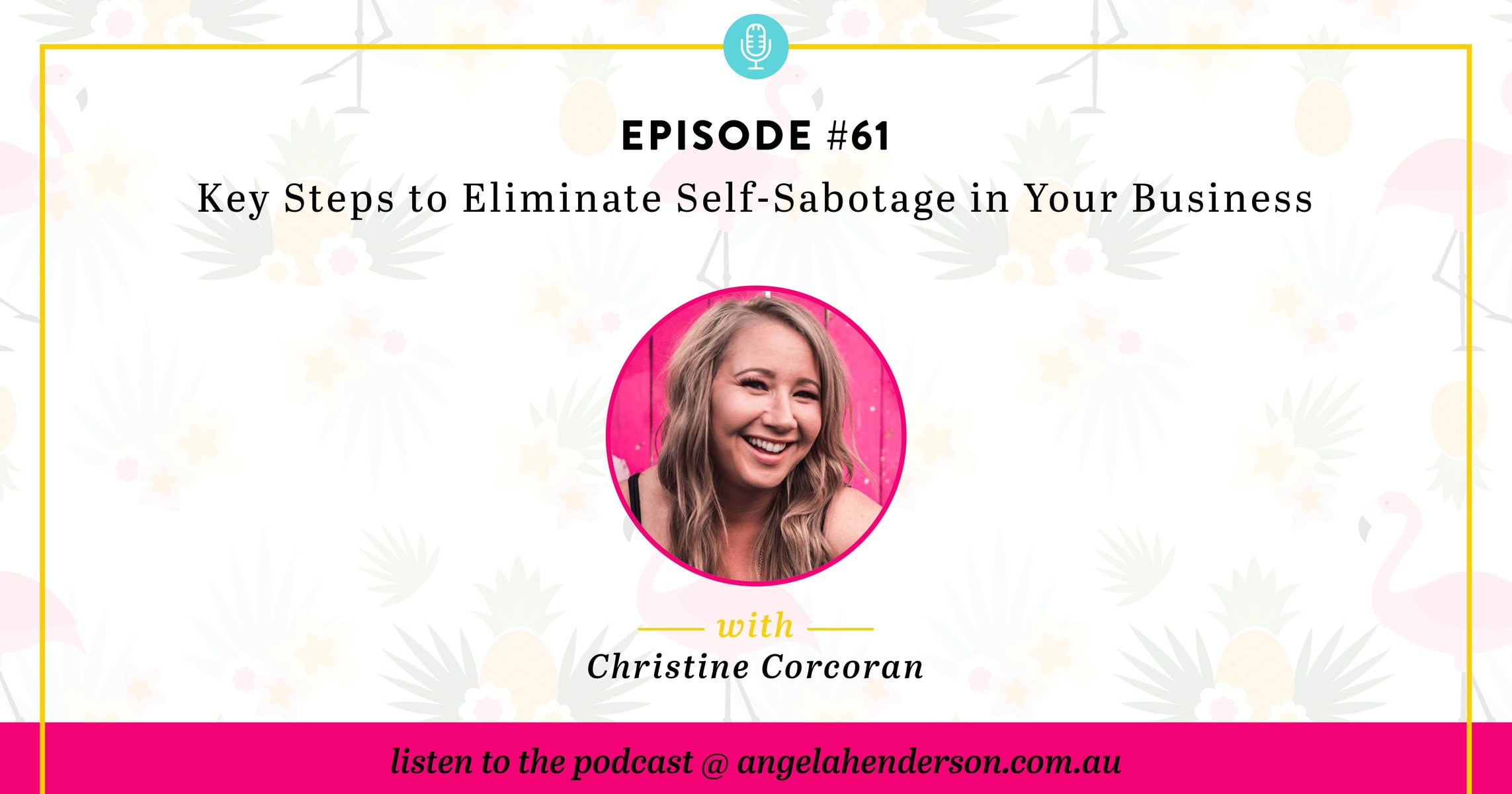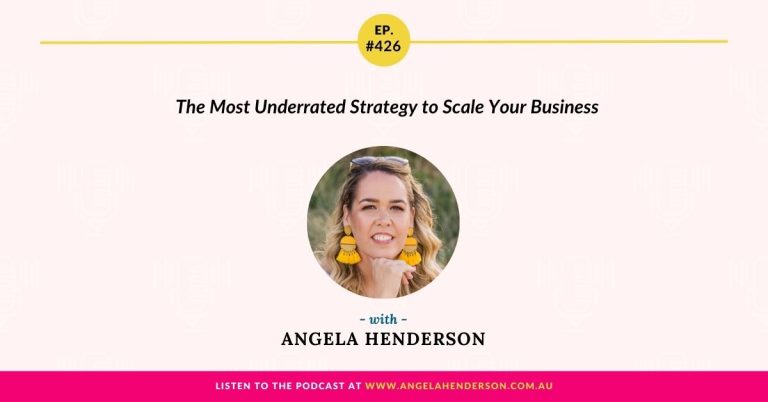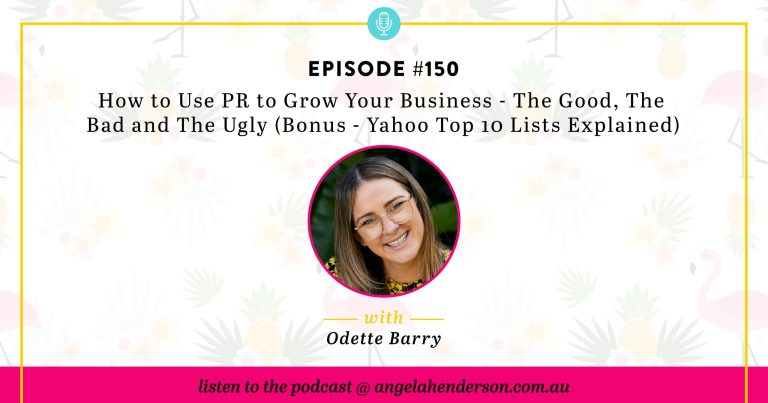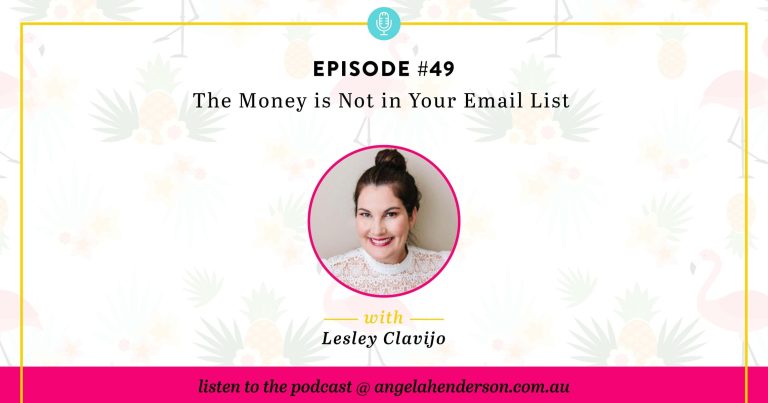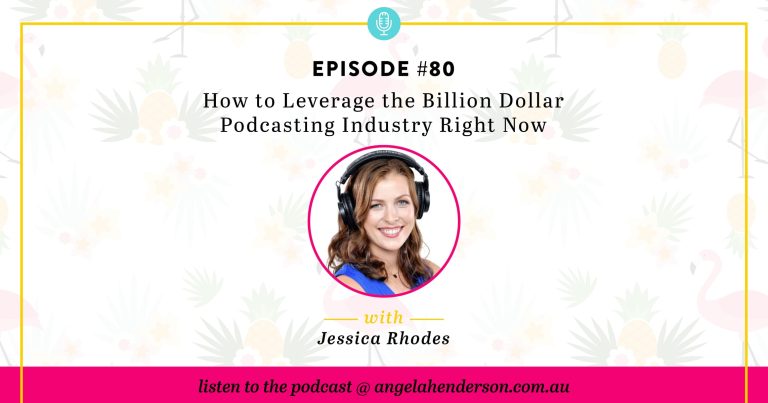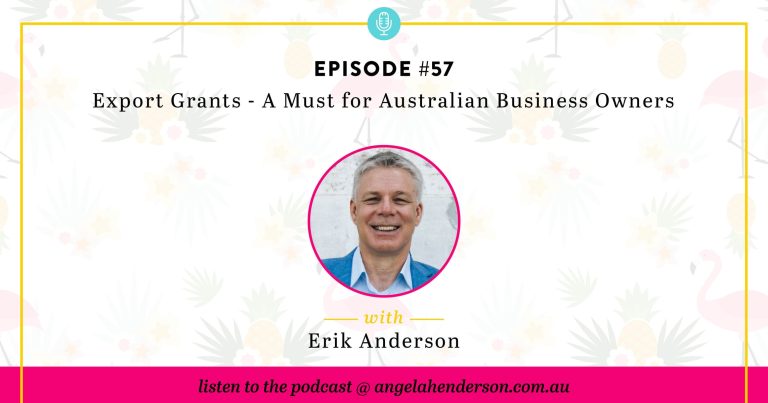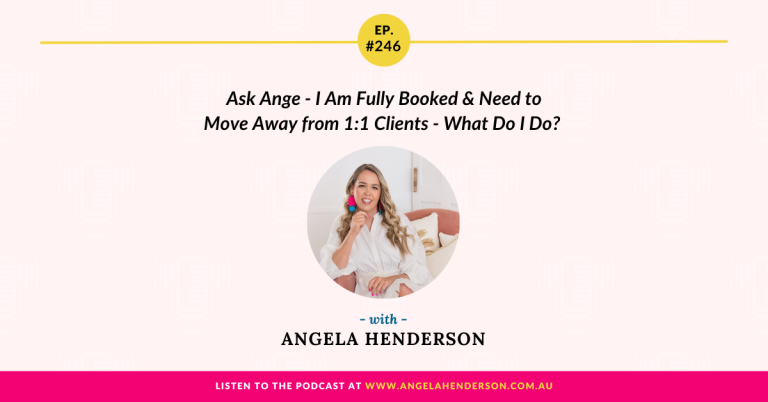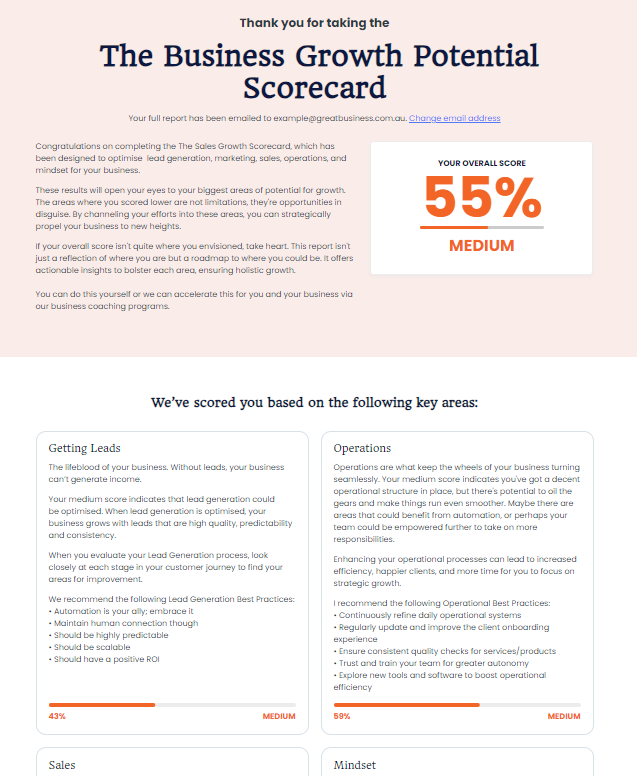What’s holding you back or keeping you stuck on reaching the goals you’ve set for yourself or your business? You may be experiencing self-sabotage and you don’t even know it. In Episode 61 of the Business & Life Conversations Podcast, Christine Corcoran, a Business Mindset Coach, shares her expertise with us on this topic. She gives us insightful details on how to know if you are self-sabotaging, the reasons why we do it, the different forms of self-sabotage, and the steps we can take to eliminate it to achieve the success you truly want for your life and business.
Important Links Mentioned in the Show:
Christine Corcoran Facebook Page
Australian Business Collaborative Facebook Group
Finding Balance in Business Women’s Retreat
Angela Henderson Active Business Facebook Group
Angela Henderson Facebook Business Page
Prefer to read Key Steps to Eliminate Self-Sabotage in Your Business? Here’s the transcript:
ANGELA:
You’re listening to the Business and Life Conversations Podcast with Angela Henderson, Episode 61.
Hey there, you’re listening to the Business and Life Conversations Podcast. My name is Angela Henderson and on this show, we talk about improving your business, life or both. By having amazing and rich conversations with brilliant guests who will inspire you and who will give you tips and tricks to help you grow both in life and in business.
Well, hey there and welcome back to another episode of the Business and Life Conversations Podcast. I am your host, Angela, from Angela Henderson Consulting, where I’m a Business Consultant helping women in business to develop the foundational framework and strategy they need to grow sustainable and profitable businesses.
Now, let’s be honest. At some point in business or in life in general, we go through the good, old self-sabotage cycle. In fact, many of us business owners go through this self-sabotage cycle like clockwork each and every day. And many business owners don’t even know it’s happening. Have you ever wanted something so, so badly? Like really, really freaking bad? And you’re working non-stop to get it? Pulling up the big guns, but yet, time and time again, you end up failing miserably? Or what about setting goals that you didn’t reach? And have you ever thought to yourself why the hell do I keep repeating the same patterns over and over again? If you have answered yes to any of these questions, you’re going to want to sit back and get ready to listen to a great episode. Because today, our guest, Christine, from Periscope Coaching, is going to be talking about self-sabotage. What is it? What is the real reason we self-sabotage? What are some of the forms of self-sabotage? And what are the steps you can take to eliminate self-sabotage from your life and in business?
But before we jump into this episode, I just want to let you know that this episode is sponsored by my new on-demand Business Masterclass, The Ultimate 4-Step Framework for Creating a Sustainable and Profitable Business. In my 60-minute jam-packed Masterclass, you will learn my signature four-step framework for creating a sustainable and profitable business without sacrificing time with your kids, without the overwhelm, or without wasting any more cash. You’re also going to learn the four big business mistakes that everyone in business makes and why they’re keeping you from growing that sustainable and profitable business. And I’m also going to touch upon what is working for businesses now and why most of what you’re being taught about growing your business is outdated and wrong. To sign up for my on-demand Masterclass, you can head to bit.ly/masterclasswithangelahenderson. And I will also include that link in the show notes.
Now, let’s get started. So welcome to the show, Christine.
CHRISTINE:
Thank you so much for having me, Angela. I’m so excited to be here.
ANGELA:
Thank you. And obviously, you’re also a Brisbane local also, which is very awesome.
CHRISTINE:
Yes, absolutely. I love Brisbane.
ANGELA:
And what are your plans? At time of recording, we’re about to go onto the weekend because I do a lot of my recordings on Friday. So what are your plans for the weekend?
CHRISTINE:
You know what’s so funny? I actually often don’t even think about the weekend until Friday. Like I actually have clients tomorrow and I love actually doing a little bit of content on a Saturday, I don’t know; it’s just my vice. And then, Sunday, I usually take the whole day off. So I’m planning to go to one of the Coast; whether it be the Gold or the Sunny Coast and just to get a little bit of downtime would be great.
ANGELA:
Oh gosh. That sounds fantastic. And again, that’s the beauty of living where we are in Brisbane is that we are really only an hour either really north, south or even east because we’re not actually on the ocean. And a lot of people think that we actually sit on the ocean; we’re still a little bit inland. So anywhere you go, we’re surrounded by beautiful oceans. And I do think there’s something to be said about getting back outside, connect with nature and just of kind reset.
CHRISTINE:
Absolutely. I think it’s something that’s needed for every single human being to get out into nature. And I think we’re so lucky, Brisbane, with this weather. Like we have incredible winter.
ANGELA:
We do. I know back home, I always say, and I have to sit a few times on my podcast. I’ll be speaking with my family and they’re like, “I thought you said it was like 20/25 out there the other day.” And I was like, “Yes.” But they’re like, “But we saw you in a hoodie and slippers and long pants. Like why? That’s a really hot summer day for us.” I was like, “Oh, no. It’s freezing.” And there’s just kind of a bit of a laugh and like, “Anj, you don’t really know anymore what freezing is.” And I’m like, “Well, in Brisbane, it’s freezing to us.”
CHRISTINE:
Yes. Absolutely. All my family are in Melbourne and they’re the same. They’re just like, “Stop showing us pictures of blue sky. That’s not winter.”
ANGELA:
Now, listen, today is a topic that really, it’s one of those things I think some people might feel uncomfortable about because they’re going to have to look at themselves and their inner selves and not just their outer selves today.
But before we really jump into self-sabotage and how that is potentially affecting businesses both positively and negatively, I always like the listeners to get to know a little bit about the guest on a personal level because I think that’s where true connections start to get forming. So my question to you, I was thinking about a variety of questions; but one of the ones that I haven’t asked in a while and I always do love is what’s your all-time favourite TV show?
CHRISTINE:
Oh my goodness. That’s so funny. I was literally in a Facebook group the other day and they asked that question. And you know what’s so random; it’s like a teenage girl kind of fan club kind of thing. I loved Buffy the Vampire Slayer.
ANGELA:
Yes. Buffy, man. Buffy made a huge impact on a lot of people back in the day. It was a must-watch. We didn’t have, as you know, back in the day, on-demand Netflix where you could binge-watch everything. You had to wait every week for an episode. So Buffy the Vampire Slayer original; your go-to favourite TV show.
CHRISTINE:
Just the things I think and the girl power and there was nothing that held her back. Like, it was just that constant, like, “I’m going to be the best of the best and I’m going to literally save the world.” I just think that the things behind it I think was really drawn to it.
ANGELA:
And again, it is.
CHRISTINE:
And the humour.
ANGELA:
It was humorous. But I do agree with you that the kind of like the subtle strength that they showed in that character was quite strong. And again, I think trying to empower females, girls collectively but it wasn’t like in your face. They did a beautiful job with that.
CHRISTINE:
Loved it. Every episode.
ANGELA:
So, well, obviously, clearly, that we’ve got the important stuff taken care of; what is your all-time favourite TV show, what can you tell the listeners a little bit about you and your business. Because not everyone will know who you are, so I also like to give just a couple of minutes introduction for you to take over and just give us a little bit more about who you are, what you’re doing now, and what that looks like.
CHRISTINE:
Sure. Absolutely. So I basically was doing a lot of business consulting for a corporate company for about six years. And how I lead into doing what I’m doing now is basically I was working with business owners to help develop their business and grow their business and found that I would be able to give him the tools and the processes to put in place to grow their business. But I would find that some business owners would take those tools and run with them and be successful. And then others wouldn’t necessarily take them and run with them. And I wanted to be able to serve my clients the best of my ability. And so, I couldn’t understand why there was that difference.
So I went back to study and to figure out, “Okay. So what holds people back? What was it, that, I’d see them one month and then next month, they done nothing.” And it was like, “What is going on?” They say that they want it but they aren’t taking action towards it. So I went back and I studied Neuroscience. I studied Human Behavior and to really understand how our brain works and how we create habits and what actually drives our behaviour. And I became so fascinated with it that I started to implement small parts of it with the clients that I was working with. And just saw massive shifts that I was just like, “This is what creates the results.”
Like it’s not even about the systems or processes. Like if you don’t believe in your ability to be successful, if you don’t believe in yourself and what you can achieve, then you can have as many systems and processes but it still doesn’t work. So that then drove me to want to do it for myself. I really wanted to work with clients that were really passionate about making impacts in the world and to be able to work with clients that literally wanted that success but couldn’t figure out was going on.
So now I work with clients one on one in their businesses. I work with coaches, consultants and service providers to really uncover what holds them back. And a lot of that is a lot of self-sabotage and I love to see the shifts that the mindset coaching can create because it’s really unearthing; what’s going on from their past or what’s going on with them now that’s holding them back from the future results that they want.
ANGELA:
And listen, I couldn’t agree more. With my own clients, too, there are some that just nail it, right? Like they just take the strategy. But I’m a firm believer that strategy is only 20% of their overall game, it’s really that 80% is that mindset. There hasn’t been a lot of information or a lot of studies, really, I guess tapping into the entrepreneurial or a small business world. But it would be really, really enticing to see. I think again, it’s those stories, those beliefs, it’s the past; it’s the combination of things. But also just from a genetics point of view, like, are you just born with the fact that like you’re going to persevere? Because there’s definitely go-getters, and then there’s people again, like you said, who want it, but then…
CHRISTINE:
I think it’s definitely people who have the natural tenacity to be an entrepreneur and to be driven towards achieving massive success. But I think that’s nothing that you can’t learn either. I think that childhood conditioning can definitely affect us in our beliefs around what we can achieve. But I think it’s possible for everybody but you’ve got to want it. And that’s the big difference I feel.
ANGELA:
Yes. And I know, for being a Mental Health Clinician for 15 years; your environment shapes a lot, significantly, about where you are, where you’re going to go, what that means, for relationships. Not just business but everything that surrounds you. Which if that’s the case, then it’s going to impact everything that surrounds you. It’s ultimately going to have a significant impact on your business, right? It’s like they go hand in hand. Again, if you’ve suffered severe trauma; that’s going to have direct influence, right? But as you said, it’s not something that you have to keep living over and over again, right? It’s just got that all and working through it, but again, it’s what is the new story that you’re going to potentially create in order for you to, like you said, be successful. Because everyone does have it within them.
I also think though it comes down to choices, right? Like we all have choices that we get to make every single day. There’s a few episodes that are going to be upcoming about personal responsibility and choices. And I think we can talk more about that later. But, sabotage and the choices; like we can give people all the tools we want. You can talk to them. I could talk to them. You can try and shift mind shift but it will still come down to people’s choice, right? And sometimes, I see in groups and I hear things of people like they try and blame this and they blame that. But I’m like, “Really? Your success in business and your failures in business ultimately comes down to you.” That’s it.
CHRISTINE:
Absolutely. You’re preaching my language.
ANGELA:
And even when I bring on new coaching clients now, too, my screening tools; and what I mean by like screening is I like to have a full assessment but to make sure that I’m the right fit. And I’m sure that you’ve got some of the same things, too. I can help them, but sometimes they’ve got to go away and work on some of the other stuff. Because if they’re going to pay the work, specifically around that strategy and also that mindset component of it, is some people, I can just see that they’re not ready for it, right? Like, we’re going to get on board and it’s going to be, “Blame this. Blame this.”
And that’s okay. And I’m happy to help. But at the end of the day, there’s almost like you’ve got to separate that sometimes, too. Like I really think that some businesses, if they could really work on that mindset and that personal growth for say, one or two months, and then jump into a little bit more, I would love to also be able to like have case studies around that, right? Like 10 people do it this way, 10 people do it this way. But, I don’t know. What are your thoughts? I can only assume that you would see significant growth so much quicker, right?
CHRISTINE:
That would be fascinating to see, actually. And I totally agree. I think it’s something that we’ve got to be mindful of how we’re showing up and what we want and the choices that we’re making. But sometimes we don’t realize, there are certain things that are holding us back. And I think, I have screen processes as well, that if I’ve clients coming to me then they’re saying things like they want someone else to do work, that they’re blaming everybody else; there’s definitely some mindset shifts you can create there. But ultimately, they’ve got to want what they want. And if they aren’t willing to actually look within, they’re not willing to look at how they’re showing up; because I’m not here to do the work for you.
ANGELA:
Exactly.
CHRISTINE:
Ultimately, it’s your decisions and the actions that you take. So if you’re all in, I’m all in.
ANGELA:
And I also know, like a lot of times I get a question like, “Anj, how quickly will I see the ROI if I hire you?” And I go, “It’s not on me to get you your ROI.” And they’re like, “What do you mean?” And I’m like, “Your happiness and your success isn’t about me. I will guide you. I will give you the strategy but you’re the person who is doing it. You’re the driver in the seat.” And so sometimes I think they want like by hiring a business coach means everything is going to be fixed. And I’m like, “That is far from the truth.” “How come?” “I’m the guider and the nurturer. But at the end of the day, you’re still the driver.”
But now, I think again, one of the interesting things you spoke about just a second ago was that sometimes, I genuinely believe people do not actually even know that they’re self-sabotaging.
CHRISTINE:
Absolutely. Absolutely. We all do it. Every human being self-sabotages in some way. And often, it’s almost like our blind spot. So some self-sabotaging behaviours are quite easy to kind of pick we’re kind of know that we’re doing it. But we’re kind of like assume we’re going to take the other action instead. Or it’s actually noticing that there’s something not working here, “I’m just not sure why I’m not doing what I’m doing.” And that’s usually an indication that there’s a deeper-seated reason for the self-sabotage. But, yes. So, so many times, we don’t realize we’re doing it. And it’s when we actually start to look into it a little bit deeper, you can actually see more of the self-sabotaging behaviours and you can then address them.
ANGELA:
Totally. Now, for those of you that again might be going, “Okay. That’s great ladies. You’re using the big word; self-sabotage.” But I just want to make sure that before we jump into some of the questions for this particular episode is, I want to kind of have a baseline about what exactly is self-sabotage? What do you think that is?
CHRISTINE:
So I believe self-sabotage is either a negative or a destructive behaviour that goes against what we want for our lives; that’s going against your goals that you’re trying to achieve or it’s going against we believe that we can be or the person we want to be. I feel it’s something that is keeping us stuck or keeping us in a place of not achieving that goal.
ANGELA:
And obviously with that, a very clear definition about feeling stuck, not achieving their goals; why do you think or what is the real reason businesses, or I guess really anyone. Anyone listening, because not everyone out there that’s listening is just business; predominantly, yes. But what do you think is really the self-sabotages?
CHRISTINE:
So self-sabotage shows up in lots of different ways. And sometimes it’s really noticing their thoughts around, “Well, I know I should be doing this. But I’m just not doing it and I don’t know why.” Usually, there’s that language around it that you kind of know that it’s something that is more deep-seated. I think that when it comes to self-sabotage and the reasons why we do it is a couple of different things that need we need to be aware of.
Firstly is sometimes the behaviour is actually negatively or destructively meeting a need. So we all have our core needs that we need to survive, that we need to know who we are in the world and that those needs actually keep us in a place of fulfilment, right? So sometimes we are actually; the self-sabotaging behaviour is actually meeting a need that we require but we don’t realize that it’s actually in an unresourceful way.
ANGELA:
Would you also say then, and it’s not only limiting meeting a need, but let’s just say also for some individuals, it could also be a form of safety.
CHRISTINE:
Hell, yes. That’s another component, right? It’s actually their keeping us safe because what might happen if I took this action and then that’s unknown. And that keeps us in a place, and say a fear. And the fear of unknown can keep us stuck for a hell of a long time. So noticing that self-sabotaging behaviour can keep us safe is majority of the reason why we self-sabotage.
ANGELA:
And when you think about self-sabotaging, again, what are some of the forms? Because there’s like really hundreds; the list is really endless. But for the sake of the listeners out there who might just not even; like again, it could just be that this episode for them is just an insight, right? Going, “Holy, shit. Actually, I don’t even know I was self-sabotaging.” So could just be the fact that we’re just educating them just about that. But what are the forms or ways that self-sabotage appears or I guess manifest in our life so that people can start to identify if they are doing this?
CHRISTINE:
Sure. And as you mentioned, like it can be sometimes very individual to the person. But for instance, to give you an idea, like some of the things that I’ve worked on with clients before. So it could be like we start to get really good results in our business or our life, and then we do something to ruin that. Or it could be that we don’t follow up on things that could be a successful action. It could be that we don’t respond.
Like I even have clients that got given an opportunity and they were contacted back. It’s a really amazing opportunity that would set their business into such an amazing trajectory of success, but they either didn’t respond to the email or didn’t get back to the phone call. There were like 50 million reasons why they didn’t necessarily do it. But it was ultimately because there were fear for what that may mean. Could be leading things to the last minute. It could be procrastinating. But I think we need to go past the point, it’s just not everyday procrastination. It’s when procrastination becomes a habit just to keep you safe.
ANGELA:
Yes. And do you think like also, sometimes I hear in groups like, “Oh, my goodness. I’ve had so much bad luck.” And it’s like again kind of that blame, right? Like, it’s the bad luck is the reason why your business isn’t succeeding. Do you think emotions play into it? Do you think attitudes play into it? Like are there other things that you see that are forms of these happening in that day to day life?
CHRISTINE:
Yes. Other forms could be that it’s actually a mechanism to avoid pain from the past. So it could be a certain experience of having the past and they don’t want to relive that experience. So, for instance, I had a client that previously had bankruptcy, which was selling a new business venture. She was doing pretty much anything to not be successful. And she even knew that she was doing it.
And so, it was fascinating because it was like, she needed to work on actually healing the past. So then, what we’re doing, the behaviour is actually designed to avoid the pain and avoid that feeling again. Or it could even be based on limiting belief patterns. So fear-base thinking like fear of the unknown, actually fear of success or fear of failure are really usually big ones as well. So it’s usually the behaviour will come in to play to keep us safe from having that happen. So it’s interesting when you start to uncover the reason behind the behaviour. And that’s when we can start to have some awareness around how we can shift and change it.
ANGELA:
And when you talk about the shifts and the changes, I think, too, like I don’t know if you follow Jim Fortin over in the United States. He is a massive guru around unconscious; really, the power of the unconscious, right? Like, the guy; he’s a legend, too. He’s amazing; Jim Fortin. His last name is F-O-R-T-I-N. But my question to you is how much do you think of this is from the unconscious behaviour versus the conscious behaviour?
CHRISTINE:
Majority of it is, when it’s self-sabotaging, that it is unconscious behaviour and there’s probably a small component of being conscious because they’re literally taking the action when they know they shouldn’t.
ANGELA:
Right. Yes.
CHRISTINE:
Vice versa; they’re not taking the action even though they should. So it’s that fear-based thinking where you just kind of push past that fear and take a little bit of action. But when it’s a consistent behaviour, and it’s literally like a long period of time, that’s when it’s usually unconscious. And the stuff that we need to heal from the unconscious mind to work on to be able to then move past it.
ANGELA:
Yes. And with that, because Jim, for example, he talks about like; I won’t name particular books because I don’t want to be damned for defamation. But let’s just say a particular book about habit breaking, right? And they talk about like, you can try and break a variety of habits. But if you don’t resolve the internal, the external actions are going to constantly keep happening.
CHRISTINE:
Absolutely.
ANGELA:
Yes. So it’s like, “Oh, quick, easy steps to the XYZ.” And I know we are going to talk about some specific steps that people can take in order to start eliminating self-sabotage. And I do want to preference before we get into that like this is just one episode to really kind of get into self-sabotage; eliminating behaviours. This isn’t something that you can just go and do a quick worksheet and then that shit’s done. This is like an ongoing.
So for those that are listening, like I said, this could be insightful. You might go and do some of the steps that we’re going to talk about next. But the reality of it is like, this could take a month. It could take a couple of months. It could take a year for some of you to work through some of these behaviours depending on how long they’ve been ingrained or part of your life. And I also think, we’re talking about self-sabotage, but some of the other things, I think that kind of compliment it, is that, is the limiting beliefs and equally the stories that people tell themselves. What are your thoughts about that?
CHRISTINE:
Absolutely. A lot of the time, the beliefs that we don’t even realize that we have and they could come from childhood; they could come from a teacher saying something once, or it could come from an experience that they’ve had. Like it usually is a belief around like, “Oh, I don’t think I could ever do that,” or “I can’t necessarily put myself out there like that.” Like usually, there’s some type of belief that is keeping them stuck that we need to uncover that like literally the subconscious mind of what it’s telling us to keep us safe but also the experience that caused it. So we can help to have some healing from the past and then we can move past it, for sure.
ANGELA:
Yes. So for those out there that are like, “Okay, obviously, maybe I do have some self-sabotaging type stuff going on and just knowing about it.” Obviously, they want to get to the root of it or they want to start to make some form of changes or again maybe just unpacking some of that. Can you share with us some of the specific steps that people need to take in order to really start looking at this, identifying it, and then really going into that eliminating that self-sabotaging behaviour, not only in business, but I guess, collectively, in life.
CHRISTINE:
Yes. Look, it works the same across the board. So it doesn’t necessarily have to be just the business. But you firstly want to have the awareness around the self-sabotaging behaviour. So first, you want to be aware of where it’s happening and why it’s happening, really. So start to notice the self-sabotaging behaviour. So if there’s something that you’re doing or not doing that’s keeping you in a place of not moving towards what you want in your life, then that’s usually a self-sabotaging behaviour. And we want to first create the awareness so then we can start to unpack it. And then, we want to look at the reason for the behaviour. So is it that it’s designed to meet a need? So are you trying to gain significance? Or is it connection? Or is it certainty? Or is it answer into that you’re trying to meet that need but it’s unresourceful, or another way to say this is almost an unsustainable way. So once we then uncover the reason for it, we can then look at, “Okay. So how do we overcome that?”
So once you know what it’s designed to support you. So if it’s either meeting a need or if it’s avoiding pain from the past or it’s a limiting belief pattern, there’s different ways that you could handle those. So say, it’s meeting a need; first, we would want to uncover another way to meet that need more resourcefully. Because there is a need there for a reason, right? So it’s like, if you’re really, really needing connection but that connection is coming from a place of you’re gossiping with friends and you know that doesn’t feel good or you’re connecting with people that are in a negative space, you know that’s really not supporting your overall goals. But you do it because it’s designed to give you that feeling like you’re a part of something. Then go and find somewhere else to be a part of; find new friends, find new people to interact with so you can still get that connection and it work towards your goals in another way. So find another way to meet that need. And usually having that awareness around it and once we have that need met in another way, we can then usually move past the self-sabotaging behaviour.
So the next one is avoiding pain from the past. So if we notice that it’s actually because of a past experience that we’ve had that has created that negative feeling that we don’t necessarily want to experience again, then we need to have some awareness around that to heal the past. So it might be that you need to work on that with a coach or you maybe need to just realize that, “Hey, I’m feeling this because I was bankrupt in the past. I don’t ever want to experience that again. What’s some things that I can put in place that make sure that doesn’t happen again?” Know that you’re going to be okay no matter what. Like the worst thing that can happen is a feeling and if you’ve been through it before, then you’re pretty much strong enough to get through it again. But having the awareness around what the experience was, at least gives us some knowledge of going, “Well, how would I handle it if it happened again?” And know that you’re still going to be okay.
ANGELA:
Yes. Fantastic. And do you think like, obviously, again, we’ve talked about this very quickly. But, and let’s just say someone wanted to start right now. What do you suggest? That again, they get a journal. They get a piece of paper. They type it on the computer. Regardless of what that looks like; I guess everyone likes to do things differently. And if you’re like, alright; so step one is, as you talked about, awareness of the self-sabotaging behaviour. So let’s just say, do we want to run through like a quick case scenario for someone?
CHRISTINE:
Yes. Sure. So for instance, so I’ll give you an interesting one like, for me. So I had one in the past that I worked on, which was a deep-seated belief around not being smart enough. And so, the self-sabotaging behaviour and how that showed up was in certain situations where I was in an environment with other people that were really well-known for what they do. They were really smart in their own right. And they might be authors or they might be really successful in what they’ve achieved. What I found my self-sabotaging behaviour was that I would retreat from the conversation and almost play small. So I would literally show up in that situation and not being your true self.
ANGELA:
Yes.
CHRISTINE:
And so, what I did at the time was, one, create the awareness, right? I was looking for, literally, prompts my brain to go, “Okay. So today, I really want to notice where I’m sabotaging my success. Where am I not showing up as my full self? Where am I holding myself back?” So creating that awareness. So at that time, I noticed that behaviour and I didn’t know of it. At the time, I couldn’t necessarily do the work on it, because I was in an environment that wasn’t really a place to do self-reflection. And so, later on, I sat down with a pen and paper and just went, “Okay. So what was the behaviour? What caused the behaviour?” And I realized, it was actually because I thought to myself that I’m not smart enough to contribute here. And then I was like, “Oh my goodness. What the hell is that?”
ANGELA:
Yes. You’re like, “Hello?”
CHRISTINE:
Yes. So I started to create some clarity around that belief by some really good question techniques to go, “Okay. So where does this come from? Why did I think this? What was going on for me at the time that made me feel that way? Is this from the past? Or is it actually from; that I’m doing it to keep myself safe? Like what was the actual thing that was the reason why I took the behaviour?” And then such notice, “So if I was to do a different behaviour next time, how would I like to show up?” I started to think about a future experience where we went and might go, “So I need to interrupt the pattern from happening again.”
So it’s really important that we go, “Okay. Have the awareness. Notice where we’re doing it.” Then take some time to reflect on it and go, “What’s the reason behind it? Was it meeting a need? Was it avoiding pain from the past? Was it a limiting belief pattern of fear-based thinking?” And that, for me, it was a fear-based thinking pattern. Then the clarity around it to really go, “Okay. So that’s not what I want to do. That’s not how I want to show up.” Then I have to interrupt the pattern. So the next opportunity that I had, was that I needed to show up differently. So having the awareness to go, “Okay. I’m in this situation again. How would I like to show up this time?” So it’s going, “Well, I would like to speak up. I would like to speak my truth. I would like to contribute to the conversation.” And by doing that, I needed to have a different belief. So my belief in the past was I’m not smart enough. So my new belief could be something, and it doesn’t necessarily have to be the opposite of, “I am smart enough.”
ANGELA:
Right. Yes.
CHRISTINE:
That’s a load of bollocks. Whereas we need to find a bridge thought around, “Okay. So I can contribute to this conversation. I am learning as I go and there’s lots that I can learn from the people around me.” So contributing to the conversation is the best way to learn from the people around me. It’s not enough for me to show up differently to go, “Okay. Let’s be a part of this conversation.” And that interrupted the pattern, interrupted that thought belief.
ANGELA:
Again, it’s like a rubber band; the more you stretch it, the more you use it, you’re going to get stronger and stronger to the point where then again, that self-sabotage is no longer there.
CHRISTINE:
Yes. And that’s literally proving that all belief wrong. We’re going and actually going, “Well, see I am part to that conversation.” And afterwards, you can take the opportunity to take the credit for yourself and go, “Hey, I contribute to that conversation. I was a part of the conversation. And no one ever turned around to me and said you’re not smart enough.” Like, see? This is where you get to grow.
ANGELA:
And that’s the thing is like, what we tell ourselves. Like when you start to really kind of unpack it and put it on paper, you’re like, “Alright. Again, I’m not smart enough.” You’re like, “Okay. Well, how many people have actually said that to me?” Like you could go recently, and you’re like, “No one. How many people said that to me 10 years ago? Okay. Nobody.” And then, like you said if you really start unpacking, “Well, hold on. When I was six or when I was seven. People said; my teacher said I wasn’t smart enough or whatever.” Like you said, you slowly start to unpack, but really if you look at it collectively, “No one in the last 20 years has said I was not smart.” But it’s still again, somewhere in you; you genuinely believe. And that’s the thing is; that feeling of ‘I’m not smart enough,’ it actually is like you feel it. I know we self-sabotage when we wake up in the morning and go, “Yey. Today is something awesome. I’m going to self-sabotage. I can’t wait for it to happen.” Like, it’s so seated in us. Like you said, you don’t even know you’re doing it.
CHRISTINE:
I think the more I work with business owners that are really wanting to up-level can be really quite obvious how they’re doing it as well, because they really kind of hitting that ceiling and going, “This is the most success that I’ve ever achieved. Oh my God, what’s next for me?”, and sometimes, the self-sabotaging behaviour can really come in favour and is really quite obvious because it’s like, they don’t believe that they belong there. It’s like the impostor syndrome comes into play. And those types of beliefs start to come into play as well because it’s like, what you’re telling yourself leading up to these opportunities.
ANGELA:
Totally. And do you think that; or have you seen in your time with working with collectively, anyone, really, but businesses, I guess, also. Is that do you see different things come up in different stages of business?
CHRISTINE:
Yes. For sure. And I think, it’s like anything in personal development; the one layer of onion you take away and then there’s another one. Like, there’s always something underneath it. But a lot of the time we’ll have growth patterns, right? So it’s like we’ll go through a stage of growth where we believe that we have the ability to take the next step. And then we take the next step and we kind of go to that next stage or we go to the next room and then it’s like, “Holy how. I’ve got whole other things I need to work on.” And then different types of beliefs come into play or different experiences from the past come and rear their ugly head or it’s designed to keep us safe. So it’s like that fear of stepping through and going, “What’s this going to mean for me and can I handle this?”
ANGELA:
Yes. 100%. And I just think that I guess if I go a little bit deeper, do you think people in startup phase struggle differently than say, people who are making 6 figures, people who are making 7 figures and people who are making 8 figures?
CHRISTINE:
Not really.
ANGELA:
No?
CHRISTINE:
Interesting. Like it’s still similar patterns of belief structures. It’s so interesting. It still comes down to the belief of, ‘Am I worthy?’ Still comes down to the self-belief for whether they believe that they belong. So a lot of the time, it’s really come down to that belief of really ‘Am I worthy and who am I?’
ANGELA:
And I can only assume that, too, that when you’re going through a significant like you said, growth phases, which happens a lot of the time. Like, “Oh my goodness. I’m doing really awesome. Oh my goodness. I suck. Oh my goodness. That was amazing.” Then, “I’m bankrupt,” or whatever, right? Like I can only, I guess, predict that you would start to see, even as hard as you could work on those self-sabotaging behaviours that at sometimes when things start to change or start to feel uneasy or maybe overwhelm, that again, they start to rear their ugly heads again?
CHRISTINE:
Yes. But I think the more you work on them, the more aware of it you are. So you start to notice them a lot quicker. Whereas before, it might be like, that self-sabotaging behaviour continued on for like a month. But now because you’re aware of it, it’s kind of like, you realized it and then you noticed it, it’s like a 2-week mark and then you can kind of change the behaviour. Or you actually start to realize like, “Hey, that’s because of that past belief. Or that’s because I’m trying to meet this need. Or that’s because that happened in the past and I no longer want to be that person anymore so I’m going to change what I’m doing right now.” So the more you work on it, I feel like it’s easier to notice it. And it’s almost like a shorter lag time.
ANGELA:
Right. So it’s like, again, so it’s not that it’s not popping in, I guess that’s what I’m trying to get; is that, it’s still there; it’s still present. But you’re able to, it rears its ugly head, yes. But you’re able to nip it in the bud so much quicker because again you’ve had the insight, you’ve worked, you’ve written it down, you’ve been working on it, you’ve been changing that belief. It’s the new one, etc. So yes, just like you said, the quicker leg time.
CHRISTINE:
Absolutely. And I think with every growth phase and every stage of success, I think you need a new belief structure or you need a new mindset to be able to overcome whatever new challenges that come in your way even though they might be from still similar past experiences. So the more you work on it, the more you uncover. But I think you need to up-level your mindset every time you up-level your level of business.
ANGELA:
Listen, I think mindset again, goes hand-in-hand with, you need different business coaches depending on where you’re at in business, too, right? And I think, you also look an athlete, for example, right? They no longer just have their physical coaches that are there. They’ve got teams of people to help them in conjunction with their training coaches, I guess. So I do think that again, you need that awareness. And I couldn’t agree more that each stage is different in business growth. You’re going to come with other obstacles and strengthening your mind is only going to strengthen the overall business.
CHRISTINE:
Absolutely. Honestly, it all comes down to mindset. Like I’ve said before, if you don’t believe it’s possible, then you could be beating your head against a brick wall.
ANGELA:
Yes. Exactly right. And what do you think it is; do you ever think that there’s particular cohorts of people or different cultures that are more likely to self-sabotage than others?
CHRISTINE:
I don’t believe so. I’ve never found that in my experience. And I’ve worked with lots of different cohorts of women. Because I think, when it comes to our core needs, like we’ve all had past experiences that have been painful. We’ve all got limiting belief patterns and structures from our childhood in our upbringing or even just the last ten years of our lives. And everything human being, no matter what culture you come from, has our 6 core needs.
So our 6 core needs are designed to actually fulfil us and to keep us safe, right? So we need the sense of belonging with connection in love. We need to feel important in people’s lives, which is significance. We need to have certainty to know that we’re going to be able to avoid pain and gain pleasure. And we need to have variety or things would be boring. We need growth and we need contributions. It’s the 6 core needs that are pretty much universal across all cultures; all human beings in the planet.
ANGELA:
And so, I guess if I go, like I used to live in Fiji, for example, right? And though, yes, obviously, we all have it. But what I’m saying is, we know for example; I was just at Mark Manson’s talk the other day at Business Chicks. And one of the things that he talks about is the stats around first world countries versus third world countries. Like we’ve got more opportunities, we’ve got more choices. But because of this, we equally are in a state of overwhelm and higher anxiety and depression, which is leading to higher suicide rates than ever before because of opportunity, etc.
Now, I know that’s slightly different from a self-sabotage, but what I’m saying is this; if you look at third world countries, is the self-sabotaging patterns more likely to happen in a first world to a second to a third world country? Or do you think again, it just as showing up might slightly different maybe because of their cultural needs and their upbringing? I guess that’s what I’m trying to look at because I’m really fascinated with the data that was presented at the Business Chicks Event because I totally agree with it, right? Is that there’s more choice. He talks about, you go to a grocery store and you’ve got 20 boxes of cereal. Most people would think that’s great. But that’s where the paradox of choice scenario comes in, is that you’re almost frozen because you’re overwhelmed with choice.
And so what I’m saying is, when our first world countries are doing things like these and there’s too much, are we more likely to self-sabotage? I don’t know. Is there a direct correlation because of the way our world is working? And it’s how busy; we’ve got lack of connection. And again, is it going back to those core beliefs? Or is it, no; it doesn’t matter if you’re third world, it doesn’t matter if you’re first world. They’re just going to show up potentially slightly different but it’s still going to happen.
CHRISTINE:
I believe we’re still going to have them no matter what. Unfortunately, I didn’t get to that talk. It sounds like it’s really good and I haven’t seen that data. So just speaking from my experience and I believe every human being has all of these experiences of having the pain from the past, the limiting beliefs and the core needs. And so, yes, that self-sabotaging will show up in some way, but definitely be different to first world countries. For sure, I absolutely agree with you that we have that paralysis around too many opportunities, too many decisions that we end up the same stuck in the one place because it’s all part of the fear of the unknown. But it’s ridiculous how many options we have, and yet we still keep ourselves stuck.
ANGELA:
Yes. All the time. And that was a really great talk. Like only a one hour talk with him but it was really, really, great to hear. That’s a whole another episode, but yes.
Now listen. So thank you for today around being able to give the listeners the opportunity to really look at their own self-sabotage for their business, what are some of the reasons that businesses might be self-sabotaging. Also again, thank you for identifying the forms of self-sabotage and ultimately giving them those key steps about being aware of what the self-sabotaging is, what are the reasons for the behaviour. And again, I guess, recreating new patterns to avoid that from happening.
But if those listeners out there that are going, “Holy shit. This is going to take a little bit longer than me doing this. I don’t quite understand this.” Where can they find you?
CHRISTINE:
So you can find me on my website which is persicopecoaching.com.au. And then I also have a podcast called The Next Level Life Podcast as well. But I think the biggest thing is you are human. And everyone experiences a self-sabotaging behaviour. But if you notice there’s something that you want to work on and you want to take to the next level, then get some support and get some help. And you working with an NLP trained coach would be the best opportunity to do that because you really want to work with the subconscious, not the conscious mind to be able to uncover the real deep-seated reasons why these self-sabotaging behaviours. But please know that you’re human and this is not an opportunity to beat yourself up because you’re self-sabotaging is what we all do and it’s totally fine. It doesn’t mean your life is over. But when we create the awareness, then we can always create a difference or change in our lives that we want for the better.
ANGELA:
And I do like the point that you said, again, don’t beat yourself up. Because it is though about awareness. And I guess it’s also about knowing where is its impact in our life. Like if you think about mental illness, for example. Is that it has to be impacting your life, like your business life, your home life, your community, etc., right? And for kids, it’s slightly different. But it’s being aware of what’s going on, what changes need to be made. It doesn’t mean that you’ve got a full-blown mental illness. It just means that there’s things that are happening and to keep a close eye on it, right? But I guess it comes down to; with mental illness, with self-sabotage, whatever; is again, you’ve got choices and there are people out there to help you if you choose to seek the help.
CHRISTINE:
Yes. Absolutely. And just start small. Just start with one self-sabotaging behaviour and work on changing that and you’ll know that that actually impacts all areas of your life.
ANGELA:
And I agree with you. And that’s what I always say. It’s like, Rome wasn’t built in a day. My clients get sick of me saying it but some of them wanted just to achieve everything and everything at once. Then there’s a little bit of overwhelm and I’m like, “No. We chunked down your strategy for a reason. Just baby steps. You’re still going to get there as long as you’re moving forward.”
CHRISTINE:
Yeah. Try the long game. It’s much more fun.
ANGELA:
Totally. Well, thank you so much for that. And again, before we sign off, my team and I will also be putting together the whole transcription for this episode at angelahenderson.com.au. And of course, I cover all sorts of related business and life topics inside my very, very active Facebook Community, The Australian Business Collaborative. So make sure to head over and join there. Have a fabulous day and I look forward to having you join me next week for another amazing episode of the Business and Life Conversations Podcast. Have a great day. And thanks again.
CHRISTINE:
Thanks so much, Angela. I really appreciate it. It’s such a great, great conversation.
ANGELA:
Thank you and have a good one.
Thanks for listening to the Business and Life Conversations Podcast with Angela Henderson, self sabotage in business. www.angelahenderson.com.au
